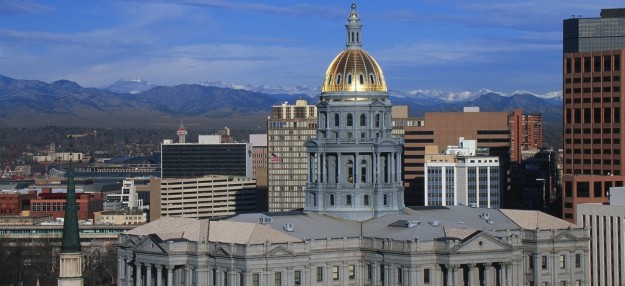Widgetized Section
Go to Admin » Appearance » Widgets » and move Gabfire Widget: Social into that MastheadOverlay zone
Climate, recycling bills survive GOP stall tactics to clear Colorado Legislature in waning days

A suite of environmental bills were among the measures that won passage in the chaotic final days of Colorado’s 2022 legislative session.
Democratic-backed legislation to better regulate toxic air pollution, improve Colorado’s dismal recycling rates and reduce greenhouse gas emissions from buildings all won approval from lawmakers and are headed to Gov. Jared Polis’ desk, overcoming the Republican stall tactics that marked the session’s end.
All three won final passage Wednesday, with just hours to go before the General Assembly’s constitutionally-mandated midnight deadline. Though Democrats, who control both the Senate and the House of Representatives, made a number of policy concessions in return for an end to GOP roadblocks, environmental advocates cheered as many of their priorities made it through the “gauntlet” before lawmakers adjourned for the year.
House Bill 22-1244, which would establish a new state program to regulate certain toxic air contaminants, raced through the Senate in just three days after winning approval in the House last week.
“As anyone who has tried to breathe in the Denver metro area this past summer knows, Colorado is facing an air quality crisis,” state Sen. Julie Gonzales, a Denver Democrat and the bill’s sponsor, said on the Senate floor Wednesday.
“This is a huge victory for our community, especially communities of color and low-income communities that have been disproportionately impacted by toxic pollutants for far too long,” Lizeth Chacon of the Colorado People’s Alliance said in a statement.
The final version of HB-1244 included an amendment proposed by Sen. Nick Hinrichsen, a Democrat from Pueblo, during a Senate floor debate on Tuesday. Hinrichsen’s amendment would give the General Assembly the power to determine which air pollutants are ultimately regulated. On final passage, the Senate passed the bill on a 21-14 vote, with all Democrats and GOP Sen. Kevin Priola in favor.
In addition to HB-1244, lawmakers passed a pair of bills that would create a $65 million grant program to help school districts purchase electric buses and a $28 million pilot program for fare-free public transit during the summer ozone season. Both were part of a package of bills touted by Democrats as ways to improve regional air quality after hazardous smog dramatically worsened along the Front Range in 2021.
Recycling programs, building emissions
Also winning final passage on Wednesday was House Bill 22-1355, a “producer responsibility” bill that would require manufacturers of many kinds of products to pay into a fund based on their product packaging, which would be used to expand recycling infrastructure across the state.
“If enacted, this legislation will help reduce the amount of plastic we produce, especially unnecessary single-use packaging, and ultimately how much plastic waste we throw away,” Rex Wilmouth, senior program director for Environment Colorado, said in a statement. “For too long, manufacturers of plastic have put the responsibility of dealing with plastic — recycling and disposal — on the shoulders of individuals and local communities. Colorado’s producer responsibility bill will make important changes to make producers responsible for cleaning up plastic waste.”
Colorado’s recycling rates have long lagged behind the national average, but business groups, including manufacturers of one commonly recycled product, have staunchly opposed HB-1355. The American Forest & Paper Association responded to the bill’s passage Wednesday by urging Gov. Jared Polis to veto it.
“(Producer responsibility) could shift the economic burden of new recycling regulations from municipalities to Coloradans,” AF&PA vice president of industry affairs Terry Webber said in a press release. “These added costs would especially hurt small businesses and low-income households.”
Lawmakers in the House also gave final approval Wednesday to a bill aimed at reducing greenhouse gas emissions from buildings, voting largely along party lines to adopt amendments passed by the Senate last week. House Bill 22-1362 would establish a statewide floor for building energy codes, requiring local governments to adopt codes that meet minimum standards for energy efficiency, rooftop solar, electric vehicle charging and more.
“Our bill takes action to address one of Colorado’s largest pollution sources and saves families money in the process,” state Rep. Tracey Bernett, a Louisville Democrat, said in a statement. “When we build right the first time, we’ll cut down on air pollution, save Coloradans money on their utility bills and create more energy efficient homes and buildings.”
Editor’s note: This story first appeared on Colorado Newsline, which is part of States Newsroom, a network of news bureaus supported by grants and a coalition of donors as a 501c(3) public charity. Colorado Newsline maintains editorial independence. Contact Editor Quentin Young for questions: info@coloradonewsline.com. Follow Colorado Newsline on Facebook and Twitter.


